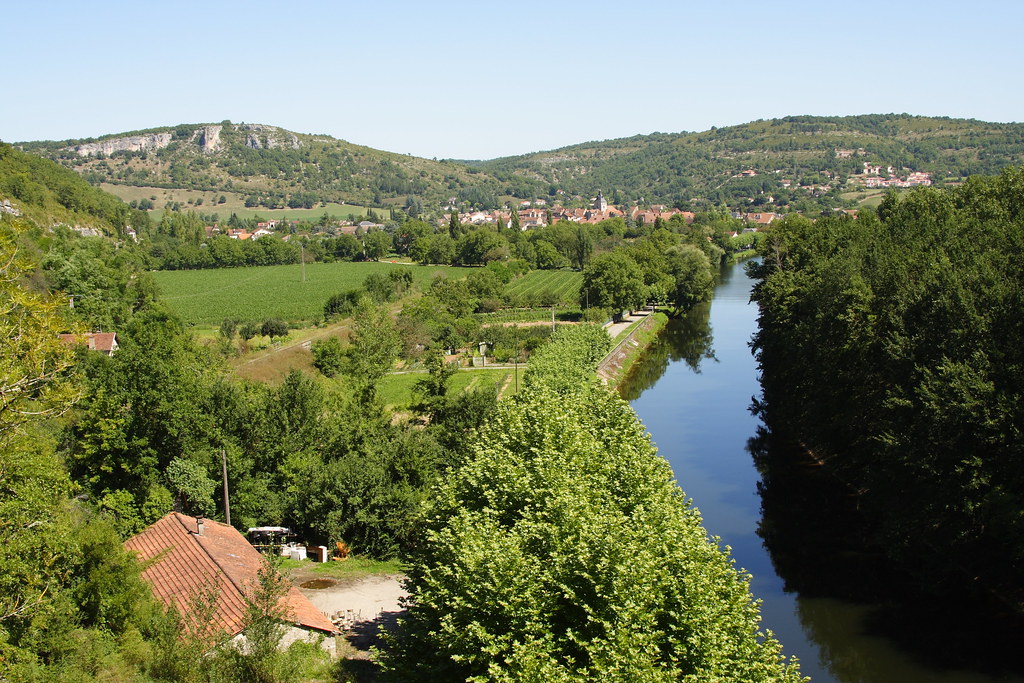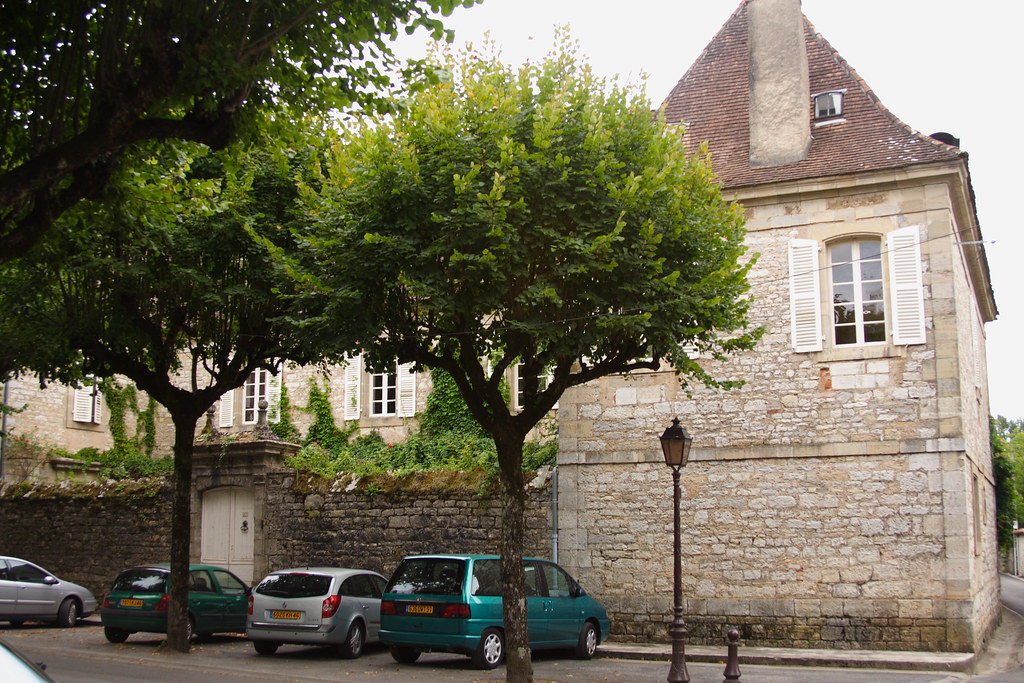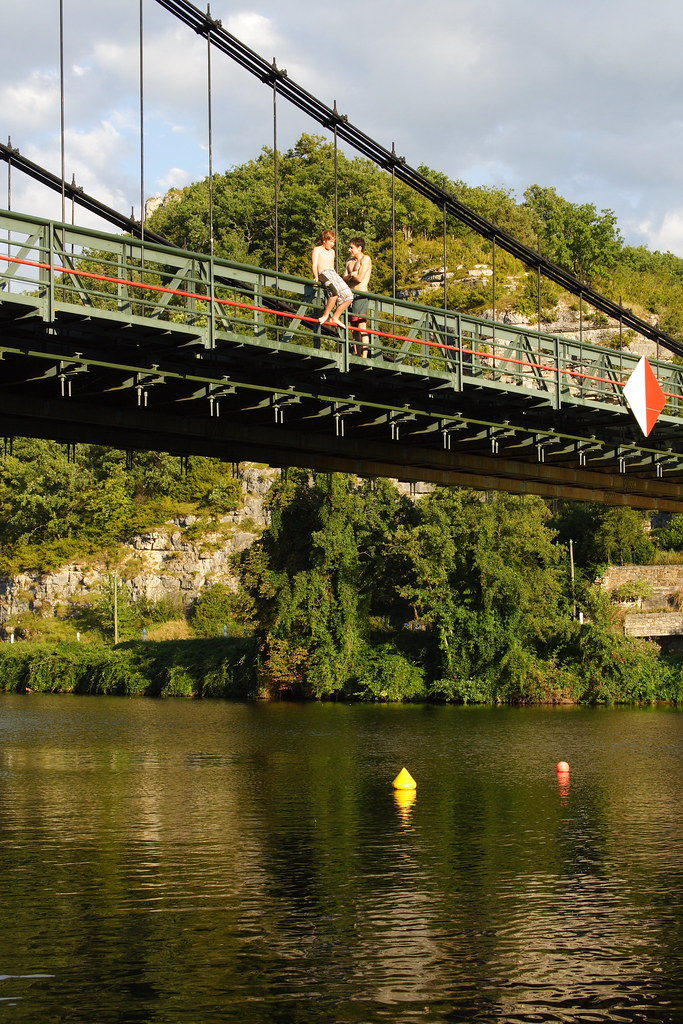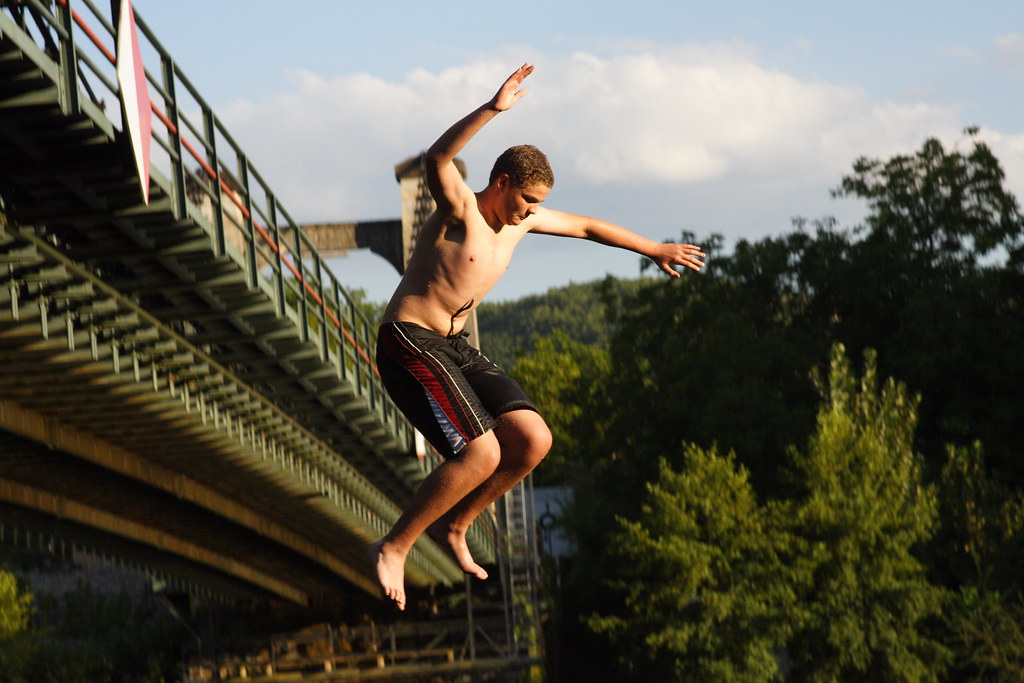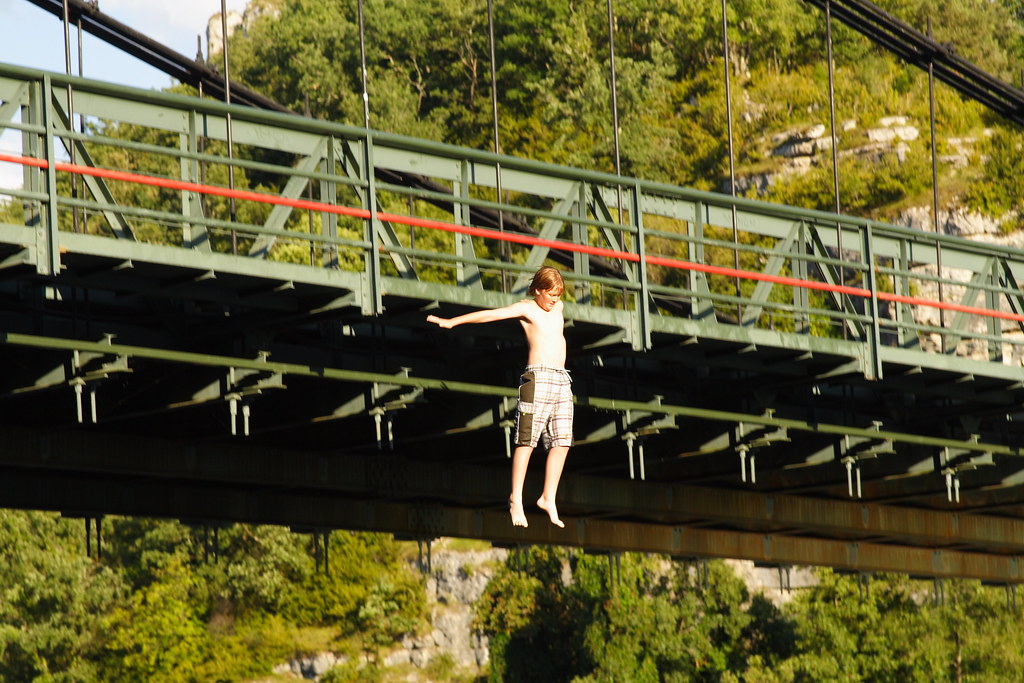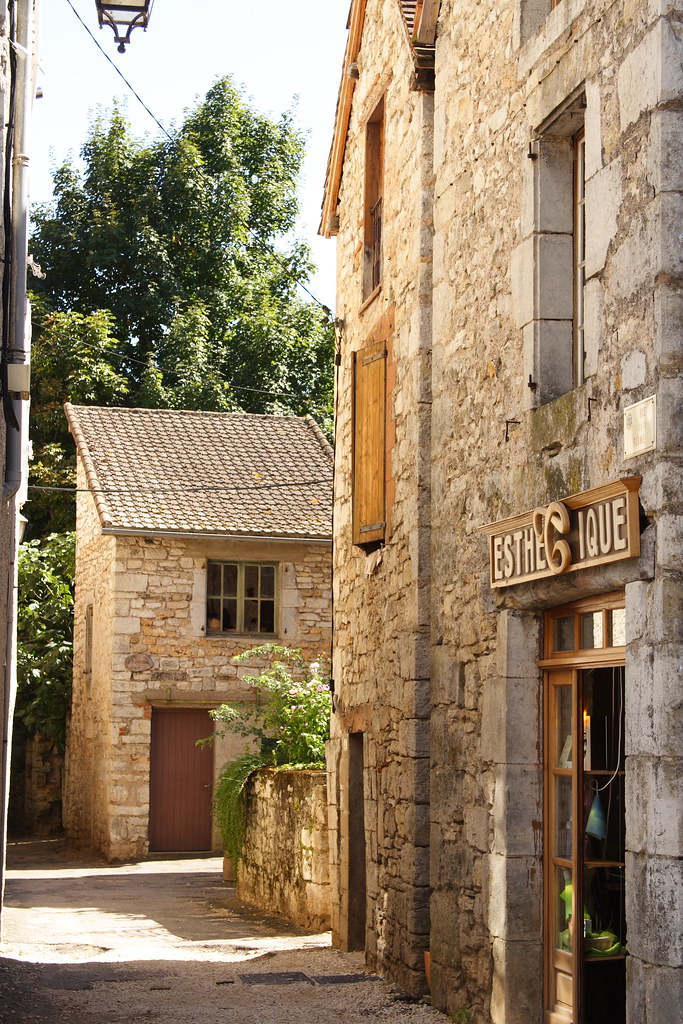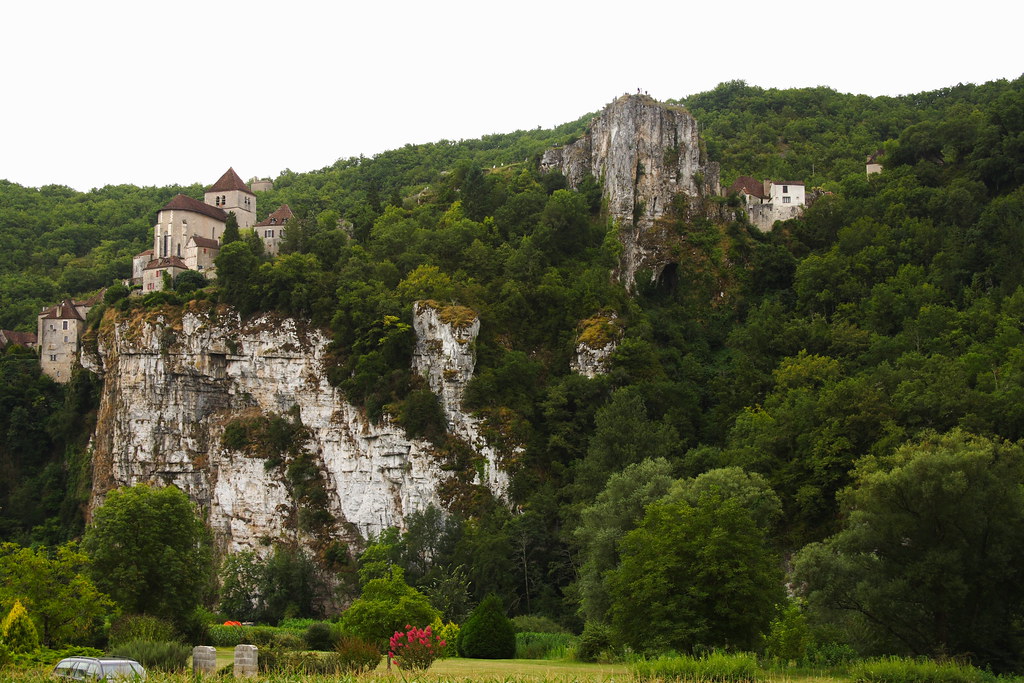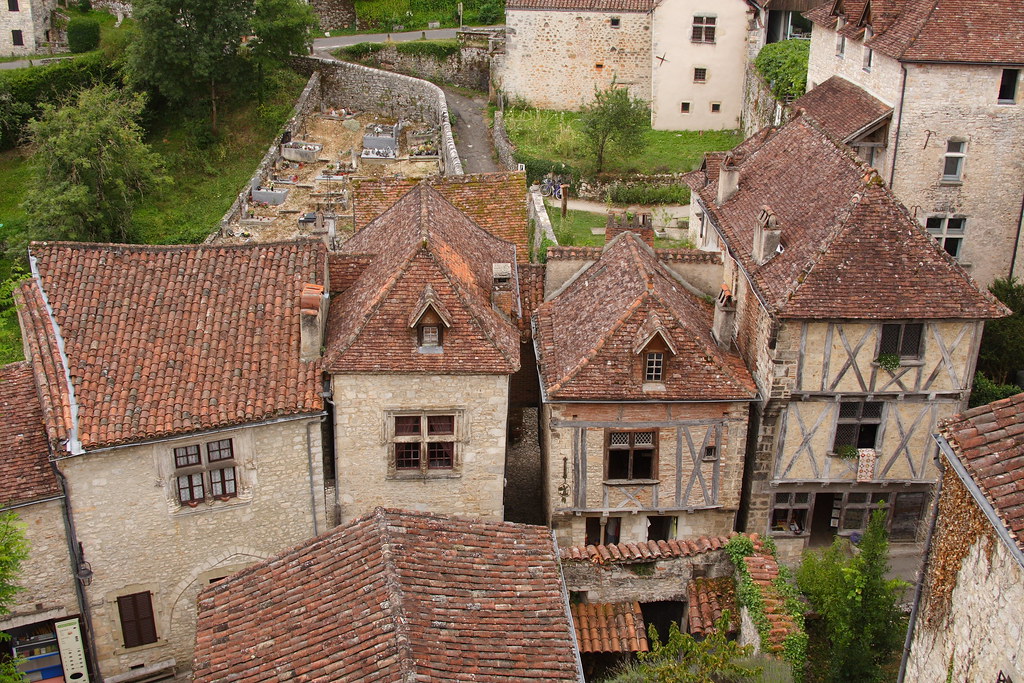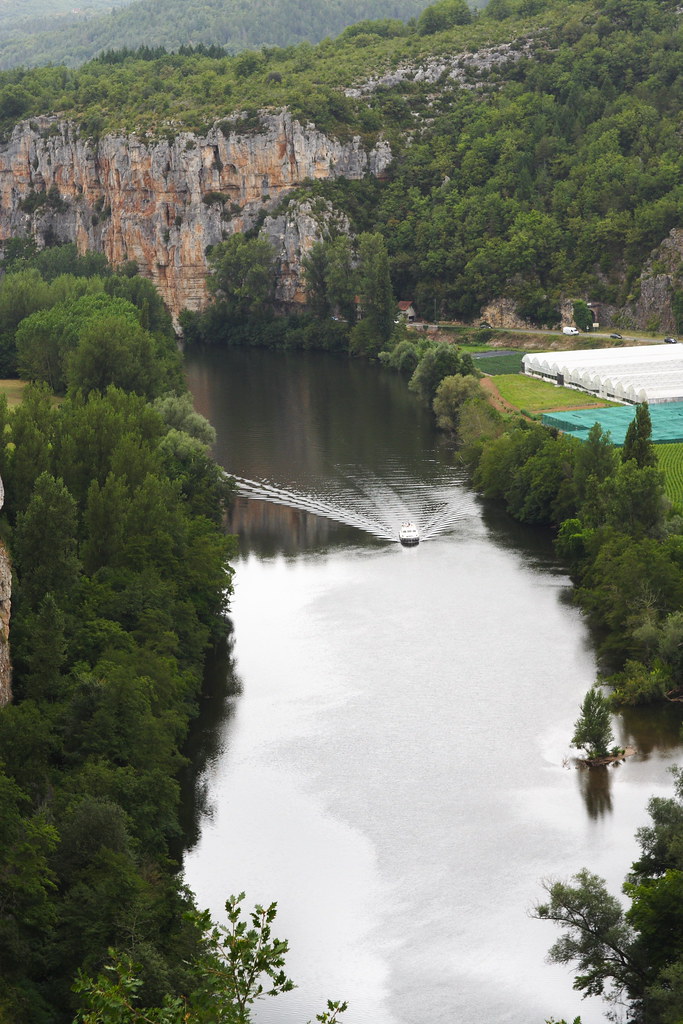As mentioned, Suzie’s father is close friends with a French couple (Francoise and Catherine Recanati) who have a summer house in a small village called Cajarc in the region called Lot. They invited us to stay with them for a night so that we could meet them and explore the surrounding region. So on Tuesday we drove to Cajarc, heading north from Toulouse. We noticed once we got off the autoroute that the countryside was very different — much hillier and much more heavily forested. But we were not prepared for what we discovered when we arrived at Cajarc.
The village sits on the River Lot, which has cut a deep gorge through the countryside. You thus have to descend to enter Cajarc, and the approach affords a remarkable view of the village and its surroundings.
We’d been given the address of the house, and told that it was in the middle of the village, across from the post office and the mairie, at number 27. What we found at number 27 was not a house, but rather a very old, very large, very beautiful stone chateau. A few photos of the exterior are below, but they do not really do justice to the house (or, I should say, to the compound, since the house and its appurtenant buildings and walls enclose an area equivalent to about two full US city blocks, with a large lawn and swimming pool and a entirely separate guest house).
We later learned that the house was built back in the 15th century (I think that’s right) and was originally a convent for nuns. At the time of the French revolution, it was seized by the state and sold to a prominent local family, who held title to the house until fairly recently, when it was sold to a third party who then sold it to the mother of Mr. Recanati.
We rather hesitantly walked to the front gate (not really a gate, but two huge old thick wooden doors) and pulled the chain for the bell. In a minute Catherine greeted us and brought us into the house. As impressive as the house was from the outside, it was even more so from the inside: old stone and tile floors; very high, arched stone ceilings; dark, dark wooden panels; large rooms; an enormous, elegant stone stairway to the second floor.
Behind the house, protected by a wing of the compound to the east and a rock wall to the south and west, is a vast lawn, with trees, vines, and a large swimming pool. After we put our stuff into our rooms, we were treated to a delicious lunch (quiche) outside on the lawn, under a trellis overgrown with honeysuckle vines. The day was warm and clear and we were very content and happy.
The Racantis have a 17-year-old son, a quiet but delightful young man, who soon turned Will and Andrew on to an unusual local activity — jumping off the suspension bridge over the River Lot. This is no small feat, as the bridge is fairly high above the river (it is safe because there is a dam not far downstream, which makes the water deep where the bridge crosses over). This give you an idea of the height:
And here are Will and Andrew in free fall:
Interesting to note the different strategies employed; Will goes for the “maximum drag” strategy, spreading himself out like a flying squirrel to try to slow his speed, while Andrew goes for the “minimum impact” strategy, making himself as small as possible so as to split the water like a needle when he its it.
Suzie and I walked around the village for a while, down narrow, narrow streets that have not changed appreciably since medieval times.
That evening, we were treated to another wonderful meal, very simple (roast beef, pasta, bread, salad, and, treat of treats, five different kinds of cheese for dessert, including an incredible soft, fresh, locally-produced goat cheese, just perfect, and ice cream for the boys. The boys eventually went out with Antoine (the 17-year-old son; they had a ball and stayed out until after midnight), and we went out with the Recanatis to a cafe, which had tables set out in a plaza right next to the river, where we ran into another woman who was a linguist and also knew Suzie’s father, who joined us. So we sat there and watched a new moon rise over the hills and the river, the evening warm and soft, speaking and listening to French and marveling from time to time at how we somehow managed to arrange everything so that we ended up here at this place, here at this time, enjoying the quiet and the conversation, and watching the darkness fall.
Neither of us slept well that night; the room was too large, and perhaps too austere, for us to feel comfortable. We got up, and got the kids up, early, as we had been told of two things in the area that we had to see: The village of Saint Cirq Lapopie, set on rocks high above the Lot, and the Grotte de Pech Merle, a large cave containing prehistoric cave paintings. Access to the latter is restricted, and it is usually necessary to have a reservation to get it, but it was raining and we hoped that some people with reservations would not show up so that we could get in. So we drove there first, arriving at about 10:25, and by 10:35 we were starting the tour! Very lucky.
Suzie and I agree that the Grotte de Pech Merle is one of the most amazing places we’ve ever been. In addition to the shear natural beauty of the cave itself, the cave paintings — 20,000 to 30,000 year old — were remarkable to see. Very, very humbling, in a way. I was especially taken by the simple hand prints that the artists had made on the wall, sending a very human message down through tens of thousands of years. At one point, you can see, very very distinctly, the footprints of several of the cave explorers, made more than 10,000 year ago. This visit was absolutely the highlight of our trip. For those interested in seeing the cave paintings and the other sights in the cave, there is an excellent English web site here.
From the cave, we drove back along the Lot to Saint Cirq Lapopie, a beautiful drive along sheer cliffs cut out by the river. This video gives a flavor. In places, houses are constructed right between the road and the cliff, using the solid rock of the cliff as their back walls.
As mentioned, Saint Cirq Lapopie sits on a rock outcropping high above the Lot.
To get to the town, you have to follow a narrow road up and up and up, then park in a lot. It is a bit touristy, but worth the crowds. We were getting hungry when we arrived, and we had been given a recommendation of a place to eat lunch, so we sought out the restaurant and, lucky again, were immediately seated on the terrace, with a view of the green hills. The lunch was outstanding (I know, you’re tired of hearing about food, but it was so good). Suzie had a foie gras salad, with foie gras that actually melted in your mouth; the boys had a menu with salad, potatoes, and wonderful duck, and I had a menu with jambon salad (ham like proscuitto but not quite, very delicious), an entrecote steak (the most delicious I’ve had in France so far, tender, delicious, and perfectly cooked), and three wonderful desserts (a nut tart for me, fruit mousse for Will, and ice cream for Andrew). The service was a little slow, but the food was so good and the setting so comfortable that we didn’t much care.
After lunch we explored the small village. It consists of old stone houses on narrow, seemingly random streets. At its highest point, it offers a stunning view of the Lot and the narrow valley formed by it.
We went back to Cajarc before returning to Toulouse, because the boys wanted to spend a bit more time with their new friend; Suzie and I drank coffee and had a conversation with Catherine about the French university system and its troubles. At about six we started home, and arrived in Toulouse dead tired.
As usual, there are more pictures here.
Lest you think our lives are nothing but leisure, today we’ve spent most of the day giving our house here in Aigrefeuille a thorough cleaning, as we are leaving tomorrow morning to return to Paris. Suzie and I will really miss this area — it is pretty and rural and calm, yet close to a big city.
Finally, I give you three events that somehow fell through the blog cracks.
1. On one of our first days here, we went to a creperie in Toulouse for lunch, and all got the menu, which was a galotte (a type of fried bread, kind of like a pancake, folded over an egg, ham, and cheese), a crepe, and a drink. The house drink was an apple cider, which the boys wanted to taste, but which we thought would be alcoholic. Well, it was quite alcoholic, but the waitress poo-pooed the idea that the boys couldn’t drink it, so they went ahead and ordered it. It came in a huge cup, which Will knocked back and Andrew slowly sipped. We later found out it was about 4% alcohol, which is, I think, more than is in beer in some states.
2. The parents of the wife of the couple we exchanged houses with took us out one evening to a very nice restaurant in downtown Toulouse, an treated us to a Toulousian meal, which was fois gras (excellent; birds must fear for their livers constantly here), cassolet (which is sausage, duck, and white beans in an incredibly rich sauce; recipe here), and dessert (mine was called a “Norwegian Sundae,” which I had never heard of, but which is described here). When the bill came, they insisted on paying it, even though we wanted to split it. They just wanted to treat us. Afterwards we followed them in their car as they gave us a brief driving tour of Toulouse at night. The evening was very enjoyable and companionable, the only difficulty for us being that the Toulouse accent is difficult for us to understand.
3. And how, you may ask, is our French? It’s been difficult being with the kids all the time, because they are speaking (constantly, incessantly, it seems) in English, so even though we are in France it sometimes feels like we might as well be in California, language-wise. But slowly we notice that we are getting better. Last weekend we went to a movie in French (a quite good one, called L’Empreinte De L’Ange, with two excellent French actresses, Catherine Frot and Sandrinne Bonnaire), and I was able to follow along with the plot quite well, and even hit about a 30 minute stretch where it seemed I could effortlessly understand everything, which, when I noticed it, immediately ended. I also have fewer “deer in the headlight” moments, when someone will say something to me (at a store, for example), and I will have absolutely no idea what they are saying. That happens almost never now. Finally, we’ve had to watch the Olympics on French TV, with French announcers (who, incidentally, are much, much, much more “hometown” in their coverage than U.S. announcers), and I’ve been able to follow most of it pretty well (except for things like fencing, which I don’t understand anyway). I’m looking forward to getting back to Paris and studying more intensely again.
That’s it for now; it’s evening and we’ve a plane to catch in the morning. Next dispatch, from Paris….
Categories: Travel -- France

